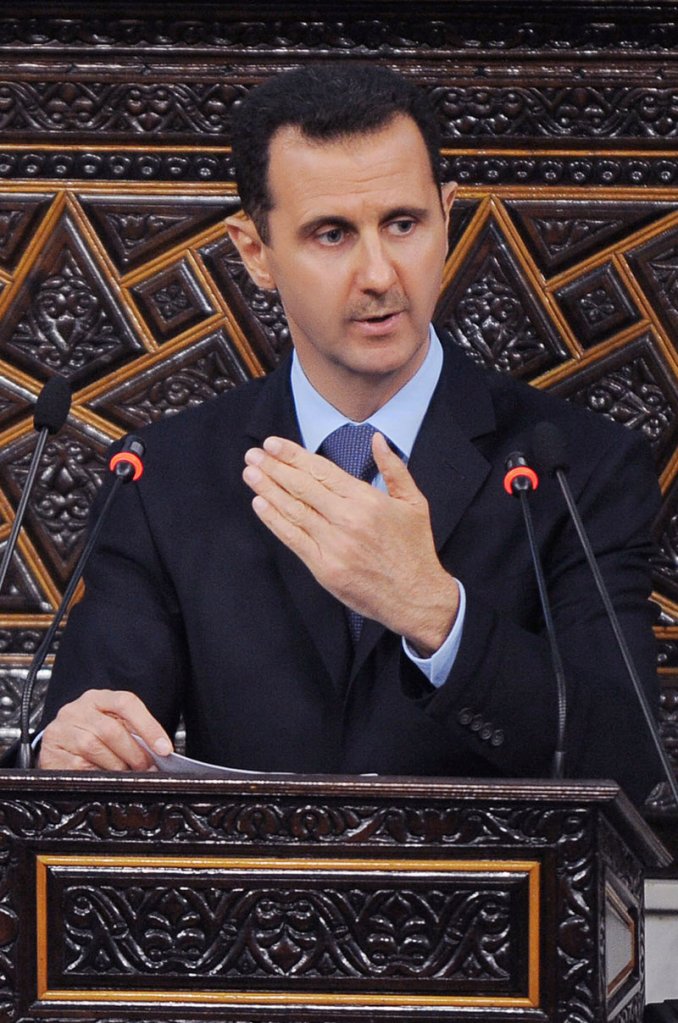WASHINGTON – Setting the stage for a major speech on changes sweeping the Middle East, President Obama on Wednesday ordered sanctions on Syrian President Bashar Assad and six of his top deputies in response to their bloody crackdown on pro-democracy demonstrations there.
The move to target Assad personally came just a day before Obama planned to talk about the “Arab Spring” that has seen autocratic governments fall in Tunisia and Egypt, threatened the regime in Libya, and seen the government of Syria use violence to try to crush anti-government, pro-democracy demonstrations.
The United States said Syria has killed nearly 1,000 people, and has done it with the help of Iran.
The administration’s order freezes any financial assets that Assad has in U.S. institutions and prohibits Americans from doing business with him.
“The actions the administration has taken today send an unequivocal message to President Assad, the Syrian leadership, and regime insiders that they will be held accountable for the ongoing violence and repression in Syria,” said David S. Cohen, acting undersecretary of treasury for terrorism and financial intelligence.
“President al-Assad and his regime must immediately end the use of violence, answer the calls of the Syrian people for a more representative government, and embark upon the path of meaningful democratic reform,” Cohen said.
A bipartisan group of senators lauded the order, saying they hoped it would lead to further sanctions from other countries.
“The president’s strong and principled action today should send an unmistakable message that the United States stands in solidarity with the brave protesters in Syria and that the Assad regime has lost legitimacy in our eyes,” said the statement from Sens. Lindsey Graham, R-S.C., Joe Lieberman, I-Conn., John McCain, R-Ariz., and Marco Rubio, R-Fla.
The Obama administration so far has refused to go that far, not yet saying that Assad has lost the “legitimacy to govern,” the wording it used about Libyan dictator Moammar Gadhafi before joining NATO allies in bombing Gadhafi’s forces to stop his violent repression of his own people.
The United States on April 29 moved to sanction top Syrian officials but spared Assad. Wednesday’s move to freeze his assets was meant to signal an escalation of pressure on Assad and his ally, Iran.
“Designating Bashar Assad is a clear inflection point in their policy,” said Michael Singh, who served as a senior director for Middle Eastern affairs on the Bush administration’s National Security Council. “When you designate a head of state, you are kind of turning the page in the relationship with that state.”
The designation adds Assad’s name to a list of international pariahs, although whether Assad is effectively isolated will depend on the Europeans — particularly Syria’s historical ally France — following suit, Singh said.
Send questions/comments to the editors.



Success. Please wait for the page to reload. If the page does not reload within 5 seconds, please refresh the page.
Enter your email and password to access comments.
Hi, to comment on stories you must . This profile is in addition to your subscription and website login.
Already have a commenting profile? .
Invalid username/password.
Please check your email to confirm and complete your registration.
Only subscribers are eligible to post comments. Please subscribe or login first for digital access. Here’s why.
Use the form below to reset your password. When you've submitted your account email, we will send an email with a reset code.